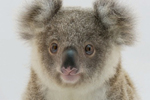Australia’s leading scientific expert on the endangered Leadbeater’s possum has publicly lambasted the Victorian state government, claiming it is the first ever domestic administration to take “calculated actions” that it knew could wipe out a threatened species.
In a letter published in the respected journal Science, Prof David Lindenmayer, of the Australian National University, states that “government-sanctioned legal logging of the reserve system will significantly increase the chance of extinction of Leadbeater’s possum.”
The letter, co-authored by Hugh Possingham, of the University of Queensland, claims that a “substantial watering down” of logging industry regulations has led to a drastic loss of the Leadbeater’s possum’s natural habitat.
It is estimated that there are just 1,500 of the tiny possums in pockets of the central highland forests of Victoria, and there are fears they may become extinct within a decade if their habitat is not conserved.
Tony Burke, the federal environment minister, who has been criticized for not intervening to safeguard the possum, told Guardian Australia that he was “deeply concerned” about the species and would push for it to be listed as critically endangered, which would ramp up conservation efforts.
|
Related articles (03/07/2013) A bushfire has forced an environmental campaigner from the top of a tree following a 449-day vigil to block logging of a stand of old-growth forest in Australia. Forests under fire: Australia’s imperiled south west (03/05/2013) In the far southwestern corner of Western Australia, beyond the famed wineries in the shadow of the Margaret River, lies an ecosystem like no other, the South West ecoregion. This part of Australia has been identified as one of 34 global biodiversity hotspots, home to rare endemic flora and fauna like the Carnaby’s black cockatoo, numbat (banded anteaters), woylie (brush-tailed bettong), mainland quokka and over 1500 plant species, most found nowhere else. Unfortunately, this unique habitat is being increasingly fragmented and its inhabitants threatened by a number of forces, including climate change, dieback, fires and logging. And, on the eve of the Western Australia’s state elections, the future of the South West hangs in the balance. Indigenous knowledge reveals widespread mammal decline in northern Australia (02/14/2013) Over the course of four years, a team of elite Australian researchers journeyed through the remote landscapes of Northern Australia to tap a vanishing resource: the wealth of knowledge carried by the indigenous inhabitants. Their study, published this year in Biological Conservation concludes that there have been major declines in native Northern Australian mammals, and also suggests a relationship between the decline of Indigenous knowledge and the decline of biodiversity. New wind power cheaper than coal or gas in Australia (02/08/2013) Electricity supplied from a new wind farm is cheaper than that from a new gas or coal-fired power plant in Australia, reports a new analysis published by Bloomberg New Energy Finance. Man drove Tasmanian Tiger to extinction in Australia (02/01/2013) Man, not disease, drove the Tasmanian Tiger to extinction, according to a new study published in the Journal of Animal Ecology. Cute koalas have become ‘urban refugees’ (01/28/2013) According to Susan Kelly, koalas have become “urban refugees,” under siege by expanding cities that bring with them deforestation, dogs, traffic, and other ills for native wildlife. Director of Global Witness, and writer, producer and director of the new documentary Koala Hospital, Kelly has spent 3 years working to understand the rising threats to one of the world’s most beloved marsupials. While Koala Hospital highlights the many perils facing koalas, including climate change due to record fires across Australia, it also looks at the efforts of individuals who work to save koalas one—by—one at Port Macquarie Koala Hospital, taking in patients who have been orphaned, hit by cars, scarred in fires, or attacked by dogs. |


